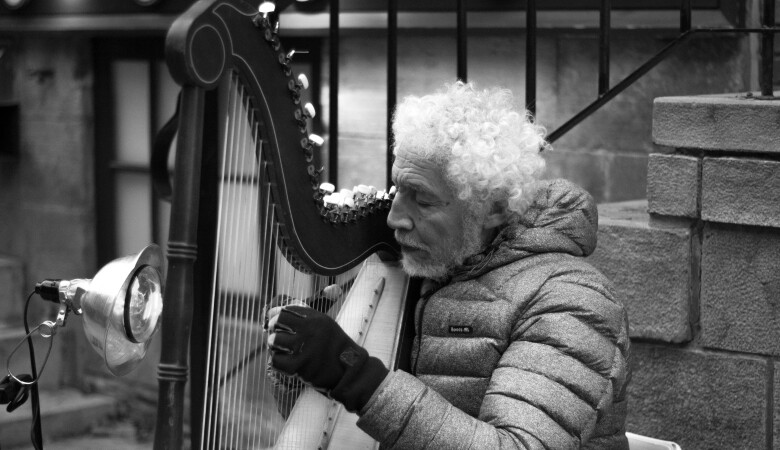Heart Righteousness and the Law (Matthew Sermon 13 of 151)
April 25, 1999 | Andy Davis
Matthew 5:27-37
The Law of God, The Power of Sin, Sexual Purity, Marriage and Parenting
Introduction
We are going be talking this morning about Matthew 5:27-37 as we continue in the Sermon on the Mount. And let's remind ourselves where we have been up to this point. Jesus Christ sat down on a mountain and began to instruct His disciples, and He gave a series of heart principles called the Beatitudes which are to characterize the hearts of those in the Kingdom of Heaven. The Kingdom of Heaven is the unifying theme of Matthew's gospel. It is the place where God reigns, where He is in control, where He is in charge, and where people gladly submit to that reign. And in order to enter that Kingdom, Jesus says right at the very beginning of the Sermon on the Mount, "Blessed are the poor in spirit (spiritual beggars), for theirs is the Kingdom of Heaven." Then comes a series of characteristics that we have examined carefully over many weeks. And then Jesus said that we as members of the Kingdom of Heaven, we as Christians, are to be salt and light in society. We are to have an impact on the community around us. That impact is to be pervasive, and it is to be powerful.
Then Jesus began to discuss relationship: among His own coming, and the disciples that He is raising up and the Law, the Old Testament. And the rest of chapter 5 has been Jesus, the Master, the one who inspired the Scripture, taking the Law and applying it forcefully to the hearts of those who will listen. The culmination of the application of this law is in verse 48 of chapter 5. We have looked at it before. And it says, "You must be perfect, therefore, as your Heavenly Father is perfect." Now, who of us can measure up to that standard? But that is the standard for Judgment Day. It is. In order to go to Heaven, you must be as perfect and as righteous as God is. And so doesn't that point back to the very beginning of the Sermon on the Mount again? Blessed are the spiritual beggars who know they are not perfect, who know that there is sin in their lives, who know that they need a savior. And who know that the real issue here is not just, how shall I say, a decision for Christ, but a righteous life for Christ. A life that flows up from a transformation that only Jesus can work. And so Jesus brings us to the Law here and the Law is applied forcefully, not just on the outside but in to search our hearts.
Then Jesus bring us to the foot of the cross as spiritual beggars and then brings us back to the Law and says this is how you should live. This is how this should affect your relationships with others in terms of anger, broken relationships. This is how it should affect your eye and your heart in terms of lust. This is how it should affect your marriage, what kind of marriage you should have as members of the Kingdom of Heaven. And this is how it should affect your truthfulness, the ability you have to say yes and it really does mean yes, to say no and it really does mean no. And we will go on until we complete this chapter next week with that culminating statement, "You must be perfect, therefore, as your Heavenly Father is perfect." So I hope I have placed you about where we are in the flow of the chapter now. We are going to be looking at some challenging issues. We are going to be looking at the issue of lust and the issue of divorce and the issue of oath-breaking. Jesus, the Master, is taking the Law and searching us with it. And we should just lay open before it and say, "Search me, O God,’ Know me, and do your work in me. I want to have it done."
I. The Uprooted Harvest
A little while ago when I was still getting my PhD in Louisville, I had to go up to Grand Rapids, Michigan. I had to make a regular trip up there every week. It was a long trip, many hours of driving. But it went through beautiful farm country in Indiana. And I remember as we drove, a friend of mine and I took this class together, we drove through the farmland, we saw rows and rows of corn that had been planted. And it just went as far as the eye could see. It was just incredible, the corn farms in central Indiana, and I will never forget it. And I began thinking about that in terms of another verse of the Bible. Every single stalk of corn was planted with a seed. Now, I am not so romantic as to think that the farmer got down on his hands and knees and planted each one, one at a time. He would not have a very big harvest in that case. I know they were planted with machines. But still, there is a hope for a harvest, isn't there? All of that planting points to a future. It is an act of hope to be a farmer. It really is. And you know something? As I look at First Baptist Church, I look at all of you who love Jesus Christ as farmers. You are all planting farms of your own. Maybe not all corn, but you have a variety of things that you are planting. Let's speak very plainly. I am talking about your lives spiritually.
Every day, everything you do plants a seed. And you are hoping for a harvest, aren't you? You are hoping that someday it will come to fruition. Perhaps you have young children, and you are training them, and you want to see a harvest in their lives. You want to see them grow up in righteousness. Perhaps you have a ministry. Maybe you teach the Bible at your work, or maybe you have a Bible study in your home. Maybe you have a prayer ministry. Everybody should have some ministry. But you are planting seeds.
But I began thinking about something, and it is in the Book of Job, chapter 31. You don't have to turn there, but I would recommend that you look at it. Job 31 is Job's final testimony about himself as a righteous man before God. And this is how he begins, and I think it is fascinating that he begins this way. Job 31:1 says this: "I made a covenant with my eyes not to look lustfully at a young maiden." Isn't that interesting that this righteous man starts there? "I made a covenant with my eyes [that I wouldn't look lustfully at a young girl]. Does not He [God] see my ways and count my every step?" He was mindful of Judgment Day, wasn't he? And he said, "God sees everything I do." What is Jesus doing here in Matthew 5 but getting us ready for Judgment Day? Isn't he? And so Job was ready when he's saying, "God sees everything I do." And later in verse 12, he says, "It [Adultery] is a fire that burns to destruction. It would have, [listen to this,] uprooted my harvest…uprooted my harvest.
Now picture that cornfield out there in Indiana pushed up from the bottom and lying flat, dead. Picture a beautiful farm with all kinds of different things in it. And the farmer waiting for the harvest and then it gets pushed up from the bottom and lies flat and dead. When I entered seminary a while ago, I entered with a man who had been a pastor for a while and the pastor was a good, successful pastor, but he felt that God was leading him into PhD work and eventually to teach somewhere. He was a wonderful man. And one day he got involved with a young woman that he met, and suddenly he stopped coming to class. He was immediately into some kind of marital counseling. I do not need to spell it all out for you. The man had committed adultery. He dropped out of seminary, began working in a local vacuum cleaning store in order to provide for his family, and he is still there, working. His harvest has been pushed up from the bottom. It has been uprooted. You all know other stories. I do not need to recite them for you. I know many in my line of work, pastors who have seen their harvest uprooted from the ground. I am constantly vigilant about this matter, and I am sad for that individual. I guess I am speaking to you today in order to save your harvests.
I do not want your harvest uprooted. You may be a Christian, you may have all your sins forgiven, but that does not guarantee your harvest, does it? You have to be vigilant and protect your harvest. You have to watch over it and take care of it. And you have to do it with a sense of fear of the outcome if you don't. I am not talking about fear of God. I am talking about fear of sin and the devastating consequences that come.
II. Christ’s Application of the Law
Let Jesus' words today protect you and protect your family, and protect your harvest, and protect your church as we listen to what He says. Beginning at verse 27, "You have heard that it was said, 'Do not commit adultery,' but I tell you that anyone who looks at a woman lustfully has already committed adultery with her in his heart. If your right eye causes you to sin, gouge it out and throw it away, it is better for you to enter life with one eye than to have two eyes and be thrown into the fire of Hell. And if your right hand causes you to sin, cut it off and throw it away. It is better for you to lose one part of your body than for your whole body to go into Hell. It has been said, anyone who divorces his wife must give her a certificate of divorce. But I tell you that anyone who divorces his wife, except for marital unfaithfulness, causes her to commit adultery, and anyone who marries the divorced woman commits adultery. Again, you have heard that it was said to the people long ago, 'Do not break your oath, but keep the oaths you have made to the Lord.' But I tell you, do not swear at all, either by Heaven, for it is God's throne, or by the earth, for it is His footstool, or by Jerusalem for it is the city of the Great King. And do not swear by your head, for you cannot make even one hair, white or black. Simply let your ‘Yes’ be ‘Yes’ and your ‘No,’ ‘No’; anything beyond this comes from the evil one.'"
You might say, "What kind of draws these three together?" Well, I think they all, each one of them, are individual case studies in how the Law can be applied to our lives, to our hearts. The issue of adultery, it is there in the Ten Commandments. The issue of divorce is also mentioned in the Old Testament, as well as the issue of oaths and oath-breaking. But I think you really could unite them together around the center one, namely the issue of marriage. What does lust attack but the sanctity of a marriage, and what is a marriage, but an oath, a vow you make before God, that you will live a certain way with another individual. Yet each of these three stands alone as well.
III. Deeper Issue: The Utter Sinfulness of the Human Heart
We have seen that in all of this application of the Law, Jesus Christ is giving a demonstration of His authority. “You have heard that it was said” "But I say to you." Do you see the authority of Jesus Christ? He has the right to tell us what the Law means. He has the right to preach to us about these matters because He is the Lord. Jesus at this point, is setting Himself against the false teaching of the Pharisees, who looked only on the outside. They were only looking on externals. Jesus probes to the heart because Judgment Day will probe to the heart. And so Jesus is getting His people ready for this. He is looking for heart righteousness, perfection, which is required on Judgment Day…a perfection, which only He can bring about in us, only through His blood and through His spirit working in us. And so we see the primary purpose of the Law, and that is the making of spiritual beggars, that we should be beggars before God saying, "I'm not righteous." Who of us can navigate their way through chapter 5 of Matthew and not feel conviction? Oh, I grieve for you. If you are able to navigate your way through this chapter, and never feel the pang of sin in your heart, something is wrong with you. I am sorry for you. We should all feel this. And we should go back to chapter 5:3 and say, "O God, have mercy on me, a sinner. Work in me, renew me, refresh me that I may be what you want me to be." The problem is we fancy ourselves as better than we really are, and Jesus' desire is to strip that away, and we should want to have that done.
IV. Adultery
This first issue of adultery, we start by considering the deed itself, the devastating deed. There is a deed of adultery. It is simply this: sexual relations with a partner who is not your spouse. It is just that simple. It is the sixth commandment of the Ten Commandments, "You shall not commit adultery." God has not rewritten that or undone that, even though our society today somewhat glorifies adultery, doesn't it? Do you ever see on the television programs, how many times are sexual relations referred to between married couples? Hardly ever. Have you ever noticed that? But they say, "Well, this is part of this temptation." “Food eaten in secret is delicious.” You see there is an indication that there is something exciting about it. There is nothing exciting about a devastated, ruined life. Nothing exciting about it at all, but this is the tone of our day. We should have instead, a proper fear of this sin. What does it say in Proverbs 6? You know how many warnings there are in Proverbs about this? There are tons. I did not know which one to choose, but I zeroed in on this one, Proverbs 6:27. "Can a man scoop fire into his lap without his clothes being burned? Or can a man walk on hot coals without his feet being scorched? So is he who sleeps with another man's wife. No one who touches her will go unpunished." You cannot scoop coals into your lap and think you are not going to get burned. So many people think, "Well, that won't apply to me," the law of sowing and reaping, "I can sow to the flesh and I'll reap to the Spirit." It does not work that way. The harvest is inevitable.
What Jesus does instead is He warns us ahead of time, "Don't get into it. Don't get yourself involved." And we should protect ourselves from this. We should be protecting one another from it. What did the Apostle Paul say? In 1 Corinthians 6:18, he says, "Flee sexual immorality. All other sins that a man commits are outside his body but he who sins sexually sins against his own body." In 1 Corinthians 9:27, what did Paul say about himself? Do you remember this? He said, "I beat my body and make it my slave, lest after I have preached to others, I myself may be... " what? "Disqualified for the prize." I do not want to be disqualified. I do not want to lose my harvest. I want to see the harvest come to fruition and so I am going to protect it by watching over myself carefully. I want to keep myself safe and protected. And so he protects himself in this matter.
Satan, throughout history, I have noticed, has pulled in opposite directions in this matter. There are people who used to live in monasteries, and in the Catholic Church I think there is a heritage. I come from the Catholic Church and a tradition of thinking that there is somehow something about marriage, which is a little bit lower. That it is a little bit better perhaps to not be married. But marriage is a holy gift from God, isn't it? It is a gift from God. And God created it. It was the first institution in society. And He desires that it be holy, but Satan says that that kind of sexual relation is evil, and so there is that teaching that the body is evil and that sex itself is evil. Well, it isn't, within the context that God placed it. But then he goes to the opposite extreme and says that all of these kinds of relations are good just as long as there is love between the two individuals. Well, that is a lie. It has to be within the committed covenant relationship of marriage.
Look at other case studies. All you have to do is look, for example, at King David. Have you ever noticed what I call the continental divide in David's life? Do you know what a continental divide is? Have you ever driven west and to the Rockies, and seen a certain point in which it says, 'This is the Continental Divide'? What that means is that the water, if you have been coming from the east going west, the water here flows back down toward the east. But across this point it is going to flow toward the west. There is a big divide there and it is really kind of spectacular moving through the Rockies that way.
I see a kind of a spiritual divide in David's life. It is in 2 Samuel 11. Everything that is good and a blessing, and purifying, and strengthening to David is before Chapter 11. Have you ever noticed this? And everything that is difficult, and wrenching, and horrible, and awful to David is after Chapter 11. Well, what happened in Chapter 11? You know what happened in Chapter 11. He committed adultery. And after that you have the death of the baby that was born by that. You have the incest of his son Amnon with his daughter Tamar. You have the killing of Amnon by Tamar's brother, Absalom. You have Absalom's exile, Absalom's rebellion. You have David's exile, a very humiliating thing. You have David cursed by Shimei, who is throwing rocks and dirt on David, and David just accepts it because he is under the discipline of God. Then you have Absalom's death and David's grief over that. You have David's weakness before Joab, who starts to almost take over the kingdom at that point. Then Sheba rebels against him and does try to take over the kingdom, it just goes on and on. Do you see that? We see blessing before, discipline after Chapter 11. And Jesus wants to spare us from all that.
So He gets to the desire behind the deed. He looks at it carefully and He says, "You have heard that it was said, 'Do not commit adultery,' but I say that anyone who looks at a woman lustfully has committed adultery with her in his heart." Does He care what is in your heart? Of course He does. Do you remember the 10th commandment of the Ten Commandments? "You shall not covet." Oh, He looks at the heart. Yes, He has always been looking at the heart. You are not supposed to look lustfully. It is not just an accidental thing where you happen to see somebody or whatever. It is a matter of gazing for a purpose. You are looking for something. And that is exactly what Jesus is warning us about. It is not an accident. And what is the danger of the desire? Well, there is a certain cause and effect. Someone once put it this way, "Sow a thought, reap an act. Sow an act, reap a habit. Sow a habit, reap a character. Sow a character, reap a destiny."
It all starts with a thought. And you at all times should be thinking, "What is this thought leading toward? Do I want to go in that direction? And if I do not want to go in that direction, cut it off. Stop it." That is what He is saying. So there is that. And what is the destiny? Well, Jesus said it is better for you to lose one part of your body than for your whole body to go into Hell. Now, two weeks ago we talked about this. It is not easy for a preacher in this day and age to stand up and talk about Hell, but that does not really matter, Jesus talked about it openly. And He said it is a threat, and it is something that you should do absolutely everything you can to avoid.
Can you, by your own works, by your own efforts, make yourself righteous enough to go to Heaven and not Hell? Absolutely not. That is where the spiritual begging comes in. Only the blood of Jesus Christ can do that. But He is speaking to all of us, and He is saying there is a danger to lust and we must fight against it. And what is the deliverance from this danger? Well, Jesus says, "Get serious about dealing with it." Yes, begin by being convicted. Say, "Yes, Lord, I do have anger in my heart," or, "I do have lust in my heart, and I need your forgiveness." It brings you back to the beginning of the Sermon on the Mount and at that point you say, "Lord, have mercy on me, the sinner. You are the only one who can save me from this sin." Isn't that what Paul does in Romans 7? Are we more righteous than he? And he says, "What a wretched man I am. Who will rescue me from this body of death?" That is what Paul says. Are we more righteous than he? We should be crying out against ourselves and letting God work in us. Let Him protect us from our sin.
Once you have come to faith in Christ, once you have received forgiveness, and there is forgiveness, brothers and sisters. There is forgiveness for everyone. Just as there was for David, there is forgiveness in the blood of Jesus Christ. That is the whole point of the atoning sacrifice, Jesus Christ's blood is sufficient to atone for all your sin. If you have faith in Him, all your sins can be wiped away, past, present and future. That is good news, but now the work is just beginning. He causes you to roll up your sleeves and say, "Let's go attack that sin. Let's work at it until it is dead." It says in Romans 8, that everyone who is led by the spirit of God, those are the people who are children of God. What does the spirit of God lead you to do? Mortify the deeds of the body. What does mortify mean? Put them to death. You start working on yourself. You roll up your sleeves and say, "Okay, if my right eye causes me to sin, what am I going to do? I am going to get rid of it." We know this is metaphorical language, right? Does your right eye cause you to sin? Well, you always have your left eye, you see? You gouge it out and then you still got one eye left. If you were blind, does that mean you would be totally free from this? No, of course not, it is a spiritual thing. But Jesus is saying, even something as valuable as a right eye or a right hand must be dispensed with if you are convinced it leads you to sin. Whatever it is, get rid of it. Is that not what Jesus is saying?
What I have come to in my ministry, I have looked at this, and I think that verses 29 and 30 are among the most under-applied verses in the Christian church. We read them and we say, "Oh, we know Jesus doesn't mean to gouge out your eyes. We know He means not to cut off your hand. Close the book, we don't need to worry about 5:29 and 30." Or maybe we say to ourselves, "Well, I'm a Christian, I don't need to have to worry about lust anymore." Oh, really? Lots of Christians did not worry about lust and their harvest got uprooted. No, instead, Jesus says, "No, take it seriously. Take it deadly seriously, fight it." How do we fight it? What do we do? Well, we begin to look at ourselves and know ourselves. Is there something inside you that leads you to lust? Does Satan use something to lead you to the sins of the flesh? If so, you know what they are. Get rid of them.
In 1920, there was a 14-year-old farm boy plowing a field out in Utah. When you plow, you go up and down, back and forth. Well, it turned out that that young 14-year-old was also a genius in electronics. This back and forth got him thinking about something, a new invention that he could work on. In 1927, Philo Farnsworth, the inventor of television, televised the first image with the electronic. What it does is it moves back and forth across the screen and your retina cannot keep up so the image stays there, the one that is built little by little. That is how you get an image in your eye. I was talking to Christi about this and we were talking about television. It is too hard to understand. I tried to read the Encyclopedia Britannica about it, I don't fully understand how it works, but I know it goes back and forth, just like somebody plowing a field. They are plowing into our eyes, aren't they? One after another. Do you know, by the way, what the first televised image was? It was a dollar sign, how appropriate. A dollar sign was the first. Philo Farnsworth chose a dollar sign. How much of what we see is connected to somebody making money from it? Lots, right? But what is the tool that they use frequently to make that money? Lust.
Have you ever noticed how many TV programs are connected to lust? Be honest, how many commercials? If your right eye caused you to sin, cut it out and throw it away. Are you courageous enough to obey this? Cut it out and throw it away. “Everyone who hears these words of mine and puts them into practice is like a wise man who built his house on the rock.” The judgment comes and the house stands because he obeyed my words. But, everyone who hears these words of mine and says, "It doesn't apply to me. I don't need it,” builds their house on sand. Isn't that the same as an uprooted harvest when the house comes crashing down? It is the same. Do not let your harvest be uprooted, do not let your house come crashing down. Hear Jesus' words and obey what He has to say.
V. Divorce
Now, the issue of divorce immediately connected to it. Lust leads to a divorce. How much pain is caused by it? What is God's true attitude about divorce? Have you ever wondered about it? You do not need to wonder. In Malachi 2:16 He tells us plainly, "I hate divorce." God hates it. Well, you could ask then, why did Moses permit them to divorce? Well, Jesus answered that question in Matthew 19. Realize Moses never commanded divorce; he just permitted it in the case of marital unfaithfulness. This is what Jesus said in Matthew 19, verse 8, "Moses permitted you to divorce your wives because your hearts were hard. But it was not this way from the beginning." He said, "Haven't you read that at the beginning, the Creator made them male and female and said, 'For this reason, a man will leave his father and mother and be united to his wife and the two will become one flesh.'" What a beautiful thing a godly marriage is. But marriage so often can become a battleground.
You know what I have come to think? I am not trying to see everything through just one little passage of Scripture, but I think if husbands and wives lived out the Beatitudes, we would not see marriage as a battleground anymore. If we were to have spiritually broken people who grieved over sin, who were meek, who hungered and thirst for righteousness, who were merciful, who were peacemakers, do you think that marriage would be a battleground? I don't think so. I don't think so at all. Marriage would be what it was intended to be, a beautiful picture of Christ and His bride, the church. But in the Kingdom of Heaven marriage is to be permanent. We are not supposed to see this scourge that we see today of so many divorces. I don't mean for those tough things in which there is so much evil and adultery and all these kind of things, I am talking about how ‘we just do not love each other anymore. We do not have that same feeling that drew us together. Or we are having relational difficulties and we are feeling pain in this relationship.’
I was reading about Abraham Lincoln's marriage. Do you know anything about Abraham Lincoln's marriage? He was married to a woman named Mary Todd. She was a difficult woman. I do not mean to say anything about the dead that is disrespectful, but she was a difficult woman. She flirted constantly with visitors to the White House. She wore shocking outfits. She threw potatoes and firewood at the president. I think under modern circumstances she may have been restrained by the Secret Service, but I think they did not know what to do, as she is throwing firewood at him. I guess before he became president, when he was still in Springfield, Illinois, she chased him around the yard with a knife. Thankfully, she didn't get him. I wonder if our nation would have been any different if she had, I think so. But you know, as we look at that… that was a difficult marriage for him. And every day there was strife and conflict in that situation. He bore with it patiently. He bore with it.
And the writer that I was reading about that said, "You know, I think it's possible that some of the qualities that we see in him, the forbearance, the patience, the tolerance, the kind of thing that lets him say in his second inaugural address, "With malice toward none, with charity for all," etcetera, that character was forged in difficult trial, and he did not push the eject button but stayed faithful to it. Now, he was not a perfect man, I'm just saying that marriage is hard and maybe you don't have two godly people working together. But at the same time, Jesus says, "Establish a godly relationship and don't take the easy way out."
VI. Oath-Taking and Oath-Breaking
The third case study is so related to the other two, and that is the issue of oath-taking and oath-breaking. And it is connected to divorce very plainly. In Malachi 2 it says, "Another thing you do, you flood the Lord's altar with tears, and you weep and wail because He no longer pays attention to your offerings. He no longer accepts them with pleasure from your hands. You ask, ‘Why?’ It is because the Lord is acting as a witness between you and the wife of your youth, because you have broken faith with her, though she is your partner, the wife of your marriage covenant. Has not the Lord made them one? In flesh and spirit, they are His. And why one? Because He was seeking godly offspring. So guard yourself in your spirit, and do not break faith with the wife of your youth. I hate divorce,’ says the Lord God of Israel." You see, divorce is the breaking of an oath, isn't it? It is the breaking of a promise. But we in our nation have become very good at that. We will make a promise, we will put our hand on the Bible and raise our hand and swear to tell the truth, the whole truth and nothing but the truth, and then lie as much as we need to. We can always get a lawyer to get us out of it.
We make promises and we break promises, and it is a modern plague, just like divorce is. And Jesus is saying, "You have heard that it was said to the people long ago, 'Do not break your oath, but keep the oaths you have made to the Lord.'" And then He says, "Okay, fine, ‘do not swear at all." Why do I say it like that? Is there anything wrong with an oath? No, there is nothing wrong with an oath. If there had been something wrong with an oath, then God would not have taken an oath never to swamp this place with water again, as He did in the flood of Noah. He made that promise, and He put the sign of His oath up in the heavens, the rainbow. God makes all kinds of promises and swears some of them with an oath. Hebrews 6, God swore that Jesus would be a high priest forever in the order of Melchizedek, and He did it with an oath. If there is something wrong with an oath, God would not have used an oath. Well, then why does Jesus say then, "Do not swear at all?" I will tell you why, because the Pharisees were playing fast and loose, they were being complex with the oath, this is how it worked.
They said, "If anyone swears by the temple, it means nothing, but if anyone swears by the gold on the temple, you're bound to your oath… If anyone swears by the altar, it means nothing. But if anyone swears by the gift on the altar, now that is something you're bound by your oath." What does that mean? Well, it means if you swear by the temple, or you swear by the altar, you can break your oath. You can break your promise as much as you want. Jesus said, "If this is your attitude, then I say, don't swear at all. If this is the way you're going to deal with oaths, “let your ‘yes’ be ‘yes,’ and your ‘no,’ ‘no. Anything beyond this comes from the evil one,” And why? What they were doing was compartmentalizing, saying, "God is not the God of the temple or the God of the altar. He is the God over here or the God over there." If you use this verbal formula, then you need to be truthful, or then you need to keep your promise or your oath. "No," Jesus said, "Every word you say is significant." Every word, every promise you make is significant. There are all kinds of covenant relationships. These people here who have come forward to be members have made a covenant relationship with this local community to be part of us. And we, when we welcome in, we will reciprocate, and we will say, "We want to be in covenant relationship with you." We are making promises to one another. We need to keep those promises.
Do you realize all the things that God has done with words? “In the beginning, God created the heavens and the earth,” and He did it with the spoken word. He did it simply by speaking, and the words came and so did the creation. And Jesus said, "Heaven and earth will disappear, but my words will never disappear." Jesus' words are a solid foundation, everything He said. When Jesus entered the world, God used this analogy, "In the beginning was the," what? "The Word, and the Word was with God and the Word was God." That is Jesus. He is the Word from God.
How does God think about words? He says on Judgment Day, You will have to give an account for every word that you have spoken. It is true, everything you say. "I tell you, that men will have to give an account on the Day of Judgment for every careless word they have spoken. For by your words you will be acquitted and by your words you will be condemned.” “Out of the overflow of his heart, his mouth speaks." Does God keep a record of your words? Oh, yes, He does. Therefore, we need to say, "Yes," and mean yes. And we need to say, "No," and mean no, because God holds us to our word.
I love Psalm 15 on this, it says, "Lord, who may dwell in your sanctuary and who may live on your holy hill? He whose walk is blameless and who does what is righteous, who speaks the truth from his heart," and listen to this, verse 4, "And who keeps his oath even when it hurts." That is the real test of character, isn't it? When you make a promise, when you make a vow, when you make a covenant and you keep it, even though it hurts you, even though it is difficult for you. That is a test of truthfulness. God says, "Such a man will be accepted on my holy hill, such a woman is faithful to her word."
VII. Summary and Application
As I look at these verses, I see something common to all three. It is not just a matter of marriage. But I see the issue of immediate gratification, wanting something now. Lust craves physical pleasure now, and gives into that now. I want it now. Divorce wants out of this painful relationship now, freedom from pain now, immediate gratification. The breaking of a vow or a promise also provides a certain amount of immediate gratification. You do not have to submit any more to the promise you made. You are free from it. But Christ's Kingdom gives us power over that kind of way of thinking. It causes us to look eternally and to say, "I don't need it now. I want to live for Heaven. I do not want to store up treasure on earth. I want to store up treasure in Heaven. I want to be faithful to my God, and I want to be holy." And even if that means pain and suffering now, bearing up under temptation, but saying no to it, I am going to do it. Why? It is because I want a harvest of righteousness to the glory of God. Jesus Christ alone gives us that kind of power.
I would like to speak a word in conclusion to you who may be feeling convicted of sin today. All of us should be convicted by these passages, all of us. We have all said, "Yes," and then meant, "No." We have all said, "No," and meant, "Yes." We have all struggled with these sins, haven't we? The issue is what do we do? The first thing is to come to the cross. Now, as a Christian, you have already come to faith in Jesus Christ. May I remind you that His blood atones for all sin? When Jesus said, "It is finished," He meant all of your sin, past, present, future, swept away. If today, you do not have a covenant relationship with God by faith in His name, I would like to invite you to come forward and talk to me about having a new relationship with Jesus Christ. Let today be the day that all your sins are washed away through the blood of Jesus Christ. But if you are a Christian already, if you gave your life to Jesus Christ, allow these verses to search you and to know you, to uncover danger points in your lives. The one thing that keeps coming through to me is that all of us will have to go through a judgment process. If we are Christians, we do not have to give account for our sins. Praise God. You do not have to give account for your sins; they are cleansed through the blood of Christ. But you do have to give an account for the stewardship matters of your life. How you spent your time. What fruit came from it? What harvest is there? He is going to want to know. Protect your harvest with holiness; protect it with obedience to God's Word. Let's close in prayer.






























